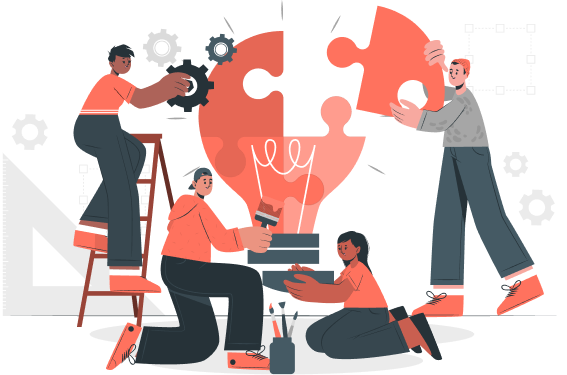Supporting you
in Building your
Leadership Legacy


About Us </span

Trellis [ˈtrɛlɪs] A structure used to support climbing plants
And that’s precisely what we do, figuratively speaking. As you continue to learn and grow in your career our aim is to help you navigate your future and provide you with the guidance and support to achieve your full potential.
We all experience challenges in some form or another throughout our personal and professional lives. Unfortunately, those aspects of our lives are not mutually exclusive to one another. On the contrary, they are deeply intertwined and heavily influence our thoughts, emotions and actions.
The good news is that you are not alone. Unfortunately, that is just not good enough to keep you or your team motivated. At some point, you will reach that dreaded stage where you want more than just a quick-fix. What you need is a long-term solution. One that resonates with you and motivates you to leap into action.
This is where we come in.
At Trellis, we probe because details matter. We listen intently to understand. We analyze information to formulate effective solutions. Above all, we understand the importance of building your legacy as you continue to lead and inspire others, and we look forward to joining you on your exciting journey.

Our Approach
Our approach is built on mutual collaboration and commitment. We value open communication. One that stems from genuine curiosity and a desire to understand underlying issues and root causes. In essence, we love to engage in ongoing dialogue.
Our aim is to become better acquainted with your corporate culture, your company’s training history (what worked and what didn’t), what you learned from those experiences and your aspirations moving forward. The more people we speak to the better! In our experience this has proved to be the perfect formula for success and a long-standing partnership.
Together, we will formulate solutions using best practices that will energize your teams and address specific challenges. More importantly, we will instill a sense of responsibility and accountability towards applying those learning outcomes back in the workplace. The employees’ learning experience is more than just the old adage of “adding tools to the toolbox”. Our workshops help employees reassess their priorities and establish new ways of thinking to create impactful moments in their everyday lives.


Our Solutions
Below are some of the main workshops our clients have repeatedly requested based on their team’s feedback. We have also included sample scenarios to further demonstrate some of the challenges we would typically explore during our workshops using research-based theories to drive discussions. If these solutions resonate with you or if you are experiencing other challenges you would like to discuss, let us connect and explore them together.
Learning Outcomes
- Uncover the signature traits of an inclusive leader
- Explore the interdependence between unconscious bias and employee behavior
- Identify the actions needed to develop an inclusive mindset to get the most from a diverse workforce
Sample scenario: A newly appointed senior leader with extensive industry experience is keen on implementing a new strategy which he had successfully applied in his previous role. The company’s challenges and vision have been communicated to him by the Senior Leadership Team (SLT) and they have also provided some insights on the corporate culture from their perspective. Armed with this knowledge, the leader has called for a meeting with his team of supervisors to communicate his strategy and the way forward, which they in turn will be cascading to their teams. The supervisors come from different cultural, educational, and professional backgrounds and have their own strong views on the matter, which they haven’t openly shared yet. They were provided with minimal information about their new manager with the expectation that they will get to know him better with time.
Questions:
- What concerns came to mind as you read the scenario?
- What sort of push back might the leader face when communicating his strategy?
- How can the leader create psychological safety for every individual within his diverse team to speak up and feel heard?
- What would you do if you were in that leader’s position?
Learning Outcomes
- Understand the difference between feedback (past behaviour) and coaching (future actions)
- Understand and manage your own emotions, as well as recognize and influence the emotions of those around you
- Cultivate curiosity by asking powerful questions to understand different perspectives and strengthen relationships
Sample scenario: You’ve recently been promoted to a supervisory role in your company’s sales department i.e. you now manage your colleagues. Your responsibilities now include giving feedback, conducting quarterly check-ins and annual performance reviews. You’re excited about this new challenge which will provide you with the opportunity to flex your leadership muscles, share your knowledge with the team and provide them with the support required to excel in their roles. You know that the team is comprised of individuals with different skills and motivation levels. Moreover, one of your colleagues has been working hard towards securing the promotion that was ultimately awarded to you and is still adjusting to the announcement. As in most organizations, sales is a numbers game! However, you also know that it is a performance game and your people are at the heart of your business. You are now faced with the dilemma of finding a healthy balance in your role between being a goal-oriented manager and a people-driven leader.
Questions:
- In what situations are you required to give direct feedback and when should you take a step back and ask more questions?
- What is the difference between coaching for performance vs coaching for development?
- How do you know what questions to ask? Who’s driving the conversation, the coach or coachee?
- How do you establish a common purpose, clarify expectations, and set goals together to improve performance and increase accountability?
Learning Outcomes
- Structure your presentation to keep your audience informed and engaged
- Connect with your audience using the right pace, tone and body language
- Inspire and motivate your audience to take action
Sample scenario: You have been nominated by your manager to prepare a presentation highlighting the company’s achievements over the past year and to communicate the company’s plans and budgets for the upcoming year. This will require liaising with your colleagues who want their contributions to be highlighted as well. Furthermore, since you work in the Finance Department you will need to adapt your presentation to suit both a finance and non-finance audience. Your presentation should help employees understand and appreciate the progress the company’s made to date, while also highlighting potential risks and opportunities for growth. Instead of using the typical telling approach, management has requested that you use an engaging approach to make the presentation memorable and impactful. They want your audience to share their ideas and insights which would increase their sense of involvement and commitment i.e. weigh-in leads to buy-in.
Questions:
- What are the risks of preparing a presentation that focuses on a topic that your audience is only vaguely familiar with and includes unfamiliar technical terms and jargon?
- How do you create an engaging presentation that caters to a wider audience with different interests, experiences and expertise?
- How should you position yourself as a presenter considering your preferred communication style and possible lack of experience with presentations?
- Why is storytelling important during presentations? How do you ensure that you do not deviate from your main objectives?
Learning Outcomes
- Explore the evolution of change management
- Recognize the importance of change leadership as a people centric approach for managing change initiatives and organizational growth
- Identify the qualities of change leaders and what they do differently to gain buy-in and increase momentum
Sample scenario: Your management team recently introduced a new initiative which they are convinced will give your company a competitive advantage and double profitability within a year. You have been appointed as the Change Leader. In theory, the initiative sounds exciting and will inspire you to step out of your comfort zone and experiment with new ideas. In reality, you’ve been given a tight deadline and an even tighter budget. Your team has already started showing signs of resistance because they feel overstretched and are not particularly keen on switching gears at this stage. In fact, they don’t see a need for this initiative and are suffering from experimental fatigue having gone through similar experiences over the past few years. Why rock the boat when everything is smooth sailing so far?
Questions:
- What are the qualities of a successful change leader in today’s complex world?
- What measures would you put in place to communicate change and gain buy-in?
- What would you do to ensure continuity and commitment considering the inevitable challenges your team will face throughout the process?
- What can you do as a change leader to create a culture that fosters both evolutionary and revolutionary change?
Learning Outcomes
- Explore the difference between transactional and consultative selling, and when to apply each
- Uncover your customer’s needs and pain points through effective rapport building and advanced questioning techniques
- Learn how to pre-empt and overcome objections by connecting emotionally and personalizing your recommended solutions
Sample scenario: Having been in the same sales roles for the past three years, you have seen it all. You have met every type of customer and can immediately determine from the minute they walk into your showroom which product they are going to select. In most cases, your hunch has been correct. You tend to ask direct closed questions to move things faster. Your sales figures indicate that you are a sales superstar with the good fortune of working in a dynamic, fast-paced market. Unfortunately, all this has changed in recent months. Customers are more price-sensitive and are asking more questions. Decisions are taking longer than usual. You are sensing their hesitation and unspoken concerns. As a result, you are starting to feel the pressure especially that your pipeline is not looking as healthy as it used to be which is adding to your frustration.
Questions:
- As an experienced sales executive, what would you say are your main strengths and weaknesses?
- What are the risks of applying the same sales approach with all customers?
- How do you determine what questions to ask when communicating with your customers?
- How can you apply a more customer-centric approach in a target-driven organization where performance is largely based on hitting your numbers?
“We are what we repeatedly do. Excellence, therefore, is not an act but a habit”- Aristotle
Learning Outcomes
- Share practices, knowledge and insights to increase engagement and enhance your learner’s experience
- Elevate your facilitation style and create high-impact delivery by learning and experimenting with new techniques in a safe environment
- Receive constructive feedback from experienced facilitators who will support and guide you throughout the workshop
This workshop is ideal for junior to mid-level trainers looking to build their confidence and enhance their facilitation skills across a wide range of audience.